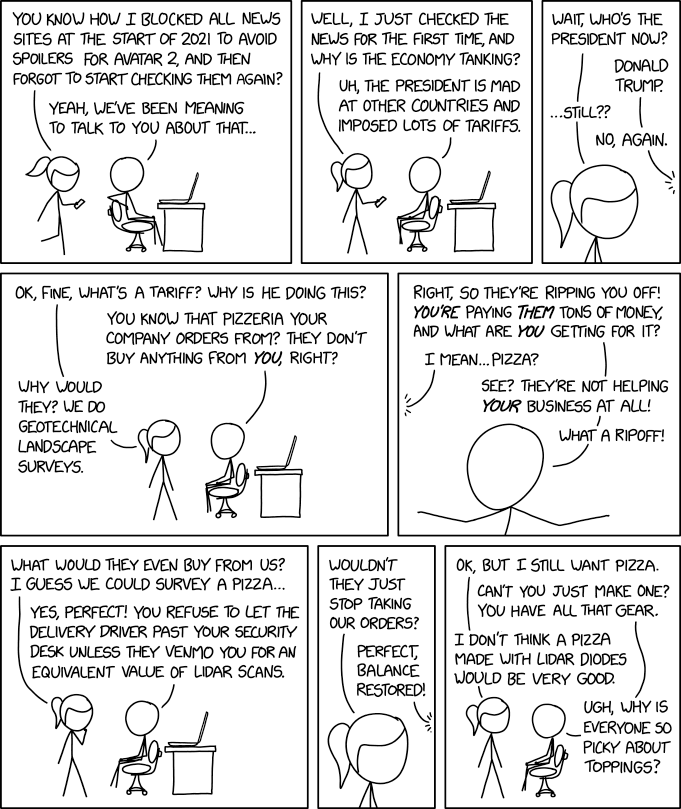






 Posted by msmash from Slashdot
Posted by msmash from Slashdot
From the closer-look department: New Mexico's legislature passed bills last week that would ban consumer products containing PFAS, joining a small but growing number of states taking action against these persistent "forever chemicals." If signed by the governor, the legislation would prohibit the sale of many products with added per- and polyfluorinated alkyl substances (PFAS) in New Mexico, making it the third state after Maine and Minnesota to enact such comprehensive restrictions.
At least 29 states have PFAS-related bills before state legislatures this year, according to Safer States, a network of advocacy organizations. Research shows PFAS accumulate in the environment and human bodies, potentially causing health problems from high cholesterol to cancer. EPA figures indicate almost half of Americans are exposed to PFAS in their drinking water.
Wired reports that chemical and consumer products industries are aggressively fighting state-level bans on "forever chemicals" through lobbying and legal action as regulations spread across the United States. The Cookware Sustainability Alliance, formed in 2024 by major cookware manufacturers, has testified in 10 statehouses against PFAS restrictions and sued Minnesota in January, claiming its ban is unconstitutional. (The New Mexico bills include notable exemptions, particularly for fluoropolymers used in nonstick cookware, following successful lobbying by industry groups.)
Industry groups are also targeting federal regulators, with the American Chemistry Council and others recommending the EPA adopt a narrower definition of PFAS. "The federal regulatory approach is preferable to a patchwork of different and potentially conflicting state approaches," said Erich Shea from the American Chemistry Council.







 Posted by msmash from Slashdot
Posted by msmash from Slashdot
From the how-about-that department: AmiMoJo writes: The Shenzhen 8K UHD Video Industry Cooperation Alliance, a group made up of more than 50 Chinese companies, just released a new wired media communication standard called the General Purpose Media Interface or GPMI. This standard was developed to support 8K and reduce the number of cables required to stream data and power from one device to another. According to HKEPC, the GPMI cable comes in two flavors -- a Type-B that seems to have a proprietary connector and a Type-C that is compatible with the USB-C standard.
Because 8K has four times the number of pixels of 4K and 16 times more pixels than 1080p resolution, it means that GPMI is built to carry a lot more data than other current standards. There are other variables that can impact required bandwidth, of course, such as color depth and refresh rate. The GPMI Type-C connector is set to have a maximum bandwidth of 96 Gbps and deliver 240 watts of power. This is more than double the 40 Gbps data limit of USB4 and Thunderbolt 4, allowing you to transmit more data on the cable. However, it has the same power limit as that of the latest USB Type-C connector using the Extended Power Range (EPR) standard. GPMI Type-B beats all other cables, though, with its maximum bandwidth of 192 Gbps and power delivery of up to 480 watts.







 Posted by msmash from Slashdot
Posted by msmash from Slashdot
From the how-about-that department: The internet's physical mass remains contested among scientists, with estimates ranging from a strawberry to something almost unimaginably small. In 2006, Harvard physicist Russell Seitz calculated the internet weighed roughly 50 grams based on server energy, a figure that would now equate to potato-weight given internet growth.
Christopher White, president of NEC Laboratories America, has dismissed this calculation as "just wrong." White suggests a more accurate method that accounts for the energy needed to encode all internet data in one place, yielding approximately 53 quadrillionths of a gram at room temperature. Alternatively, if the internet's projected 175 zettabytes of data were stored in DNA -- a storage medium scientists are actively exploring -- it would weigh 960,947 grams, equivalent to 10.6 American males. Though scientists debate measurement methods, White asserts the web's true complexity makes it "essentially unknowable."



 [later] I don't get why our pizza slices have such terrible reviews; the geotextile-infused sauce gives the toppings incredible slope stability!
[later] I don't get why our pizza slices have such terrible reviews; the geotextile-infused sauce gives the toppings incredible slope stability!  Over the weekend, A Minecraft Movie hit theaters nationwide. The adaption of Mojang’s uberpopular crafting and survival game has already made over $300 million worldwide. And it’s kickstarted some chaotic scenes at theaters thanks to single line of dialogue.
Over the weekend, A Minecraft Movie hit theaters nationwide. The adaption of Mojang’s uberpopular crafting and survival game has already made over $300 million worldwide. And it’s kickstarted some chaotic scenes at theaters thanks to single line of dialogue.
 South of Midnight is a thrilling adventure set in the Deep South that sees you take on the role of a Weaver, a mender who brings peace to distraught spirits. This narrative-forward experience is a simple (but at times emotionally powerful) tale that will keep most folks glued to the screen from beginning to end. If…
South of Midnight is a thrilling adventure set in the Deep South that sees you take on the role of a Weaver, a mender who brings peace to distraught spirits. This narrative-forward experience is a simple (but at times emotionally powerful) tale that will keep most folks glued to the screen from beginning to end. If…
 South of Midnight’s multiple skill trees are fairly linear, but you’ll still need to make some decisions as to which you’ll want to invest in first. It’ll take a bit of time to accrue enough Floofs (upgrade points) to buy a new skill. And while you can eventually max out your skill trees if you find all of the Floofs…
South of Midnight’s multiple skill trees are fairly linear, but you’ll still need to make some decisions as to which you’ll want to invest in first. It’ll take a bit of time to accrue enough Floofs (upgrade points) to buy a new skill. And while you can eventually max out your skill trees if you find all of the Floofs…
 Compulsion Games’ South of Midnight is a breath of fresh air, offering a straightforward adventure that harkens back to an era when such linear experiences were the norm. With a folklore-laden story that’s equally heartwarming and heartbreaking, as well as simple yet enjoyable gameplay, there’s an awful lot to love…
Compulsion Games’ South of Midnight is a breath of fresh air, offering a straightforward adventure that harkens back to an era when such linear experiences were the norm. With a folklore-laden story that’s equally heartwarming and heartbreaking, as well as simple yet enjoyable gameplay, there’s an awful lot to love…
 Many games are set in America, but few truly feel American. And I don’t mean that most games lack patriotism or red, white, and blue banners. I mean that, while they may use the country’s landmarks, stars, and cities, and even make reference to its politics, they don’t truly engage with American culture. South of…
Many games are set in America, but few truly feel American. And I don’t mean that most games lack patriotism or red, white, and blue banners. I mean that, while they may use the country’s landmarks, stars, and cities, and even make reference to its politics, they don’t truly engage with American culture. South of…

 Nintendo has confirmed that Switch 2's Joy-Cons will not use Hall Effect thumbsticks despite all the stick drift issues Switch owners have put up with since the console launched in 2017.
Nintendo has confirmed that Switch 2's Joy-Cons will not use Hall Effect thumbsticks despite all the stick drift issues Switch owners have put up with since the console launched in 2017.
 There’s a scene quite early on in A Minecraft Movie that, to the unaware, would completely pass you by. As Jack Black’s Steve introduces the newly arrived humans to his village, young teenager Henry sees a pig walk past wearing a crown. He asks, “Is he some kind of king?” And for those in the know, the blubbing begins.
There’s a scene quite early on in A Minecraft Movie that, to the unaware, would completely pass you by. As Jack Black’s Steve introduces the newly arrived humans to his village, young teenager Henry sees a pig walk past wearing a crown. He asks, “Is he some kind of king?” And for those in the know, the blubbing begins.
 The Final Fantasy Universes Beyond set for Magic: The Gathering doesn’t drop until June 13, but previously unrevealed cards have already been spotted in the wild after a starter kit seemingly got into someone’s hands early. Thanks to the decks inside, fans have now gotten early looks at Steiner from Final Fantasy IX,…
The Final Fantasy Universes Beyond set for Magic: The Gathering doesn’t drop until June 13, but previously unrevealed cards have already been spotted in the wild after a starter kit seemingly got into someone’s hands early. Thanks to the decks inside, fans have now gotten early looks at Steiner from Final Fantasy IX,…
 Last week, during Nintendo’s big Switch 2 Direct, the Mario maker showed off its fancy upcoming console, revealed some high-priced games, and announced a brand new 3D Donkey Kong game, too. And while it might not be the 3D Mario game many hoped for, Donkey Kong Bananza looks really awesome and a perfect showcase for…
Last week, during Nintendo’s big Switch 2 Direct, the Mario maker showed off its fancy upcoming console, revealed some high-priced games, and announced a brand new 3D Donkey Kong game, too. And while it might not be the 3D Mario game many hoped for, Donkey Kong Bananza looks really awesome and a perfect showcase for…

 In the years since The Last of Us Part II launched in 2020, I’ve noticed a fascinating phenomenon when people talk about Naughty Dog’s divisive sequel. Some people talk about Ellie’s revenge story in ways that seem incongruous with the game I experienced. Where I would call The Last of Us Part II a beautiful tragedy…
In the years since The Last of Us Part II launched in 2020, I’ve noticed a fascinating phenomenon when people talk about Naughty Dog’s divisive sequel. Some people talk about Ellie’s revenge story in ways that seem incongruous with the game I experienced. Where I would call The Last of Us Part II a beautiful tragedy…